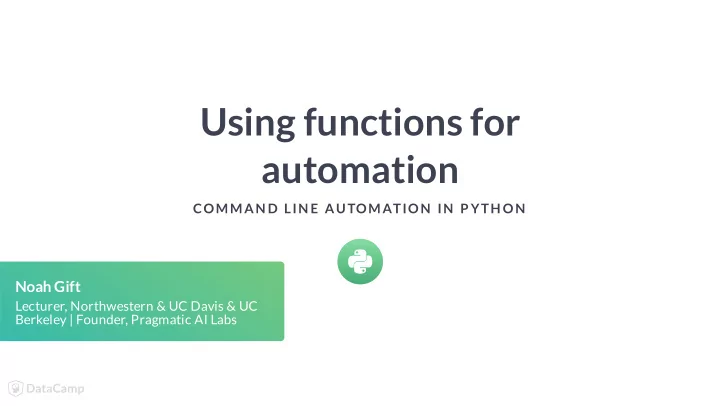

Using functions for automation COMMAN D LIN E AUTOMATION IN P YTH ON Noah Gift Lecturer, Northwestern & UC Davis & UC Berkeley | Founder, Pragmatic AI Labs
Functions are units of work functions are units of work def work() """Performs work""" return 1+1 In [1]: work() Out[1]: 2 COMMAND LINE AUTOMATION IN PYTHON
Accepting input into a function function that accepts input def more_work(x,y): """Adds two variables""" return x+y In [2]: more_work(5,6) Out[2]: 1 more_work(9,6) Out[3]: 15 COMMAND LINE AUTOMATION IN PYTHON
Decorators are also functions from functools import wraps import time def instrument(f): @wraps(f) def wrap(*args, **kw): ts = time.time() result = f(*args, **kw) te = time.time() print( f"function: {f.__name__}, args: [{args}, {kw}] took: {te-ts} sec") return result return wrap COMMAND LINE AUTOMATION IN PYTHON
How does a decorator work? from functools import wraps def do_nothing_decorator(f): @wraps(f) def wrapper(*args, **kwds): print('INSIDE DECORATOR: This is called before function') return f(*args, **kwds) return wrapper @do_nothing_decorator def hello_world(): """This is a hello world function""" ( ) COMMAND LINE AUTOMATION IN PYTHON
Using a hello world decorator # Call the decorated function hello_world() INSIDE DECORATOR: This is called before function Hello World Function # Name is preserved print(f"Function Name: {hello_world.__name__}") Function Name: hello_world COMMAND LINE AUTOMATION IN PYTHON
Timing decorator in action @instrument def lazy_work(x,y, sleep=2): """Sleeps then works""" time.sleep(sleep) return x+y In [7]: lazy_work(4,9) function: lazy_work, args: [(4, 9), {'sleep': 3}] took: 3.000096082687378 sec Out[7]: 13 COMMAND LINE AUTOMATION IN PYTHON
Putting it all together Functions are units of work Functions are more powerful when they take input Decorators are functions too COMMAND LINE AUTOMATION IN PYTHON
Examples of common decorators Many automation tasks involve functions and decorators flask web framework click command line tool framework numba open source JIT compiler custom pro�ling, tracing and timing COMMAND LINE AUTOMATION IN PYTHON
Let's practice! COMMAN D LIN E AUTOMATION IN P YTH ON
Understand script input COMMAN D LIN E AUTOMATION IN P YTH ON Noah Gift Lecturer, Northwestern & UC Davis & UC Berkeley | Founder, Pragmatic AI Labs
Use sys.argv sys.argv captures input to script import sys print(sys.argv) $ python ./script.py one two # Remember that Python lists index at 0 ['script.py', 'one', 'two'] COMMAND LINE AUTOMATION IN PYTHON
Parsing arguments Parse arguments by index # grab first argument arg1 = out[1] print(arg1) one COMMAND LINE AUTOMATION IN PYTHON
Writing a script with sys.argv anatomy of a python sys.argv script import sys def hello(user_input): print(f"From a user: {user_input}") if __name__ == "__main__": arg1 = sys.argv[1] hello(arg1) COMMAND LINE AUTOMATION IN PYTHON
Parsing input from script python hello_argv.py something From a user: something python hello_argv.py another From a user: another COMMAND LINE AUTOMATION IN PYTHON
Let's practice! COMMAN D LIN E AUTOMATION IN P YTH ON
Introduction to Click COMMAN D LIN E AUTOMATION IN P YTH ON Noah Gift Lecturer, Northwestern & UC Davis & UC Berkeley | Founder, Pragmatic AI Labs
What is click? Python package for creating 'beautiful' command line interfaces Three main features: arbitrary nesting of commands automatic help page generation lazy loading of subcommands at runtime COMMAND LINE AUTOMATION IN PYTHON
Basic click structure import click library import click use command decorator and option decorator @click.command() @click.option() def func(): pass call function when run as script if __name__ == '__main__': () COMMAND LINE AUTOMATION IN PYTHON
Simple click example import click @click.command() @click.option('--phrase', prompt='Enter a phrase', help='') def tokenize(phrase): """tokenize phrase""" click.echo(f"tokenized phrase: {phrase.split()}") if __name__ == '__main__': tokenize() COMMAND LINE AUTOMATION IN PYTHON
Using a click application running from the terminal python hello_click.py user prompted to enter phrase Enter a phrase: this is a rabbit output of click application tokenized phrase: ['this', 'is', 'a', 'rabbit'] COMMAND LINE AUTOMATION IN PYTHON
Automatic help generation ? python hello_click.py --help Usage: hello_click.py [OPTIONS] tokenize phrase Options: --phrase TEXT --help Show this message and exit. COMMAND LINE AUTOMATION IN PYTHON
Let's practice! COMMAN D LIN E AUTOMATION IN P YTH ON
Using click to write command line tools COMMAN D LIN E AUTOMATION IN P YTH ON Noah Gift Lecturer, Northwestern & UC Davis & UC Berkeley | Founder, Pragmatic AI Labs
Mapping functions to subcommands import click @click.group() def cli(): pass @cli.command() def one(): click.echo('One-1') @cli.command() def two(): click.echo('Two-2') if __name__ == '__main__': cli() COMMAND LINE AUTOMATION IN PYTHON
Using click subcommands python click_functions.py Usage: click_functions.py [OPTIONS] COMMAND [ARGS]... Options: --help Show this message and exit. Commands: one two python click_functions.py one COMMAND LINE AUTOMATION IN PYTHON
Click utilities click utilities can: generate colored output generate paginated output clear the screen wait for key press launch editors write �les # Write with click with click.open_file(filename, 'w') as f: f.write('jazz flute') COMMAND LINE AUTOMATION IN PYTHON
Click and stdout import click click.echo('Hello DataCamp!') Hello DataCamp! click.echo can: generate colored output generate blinking or bold text print both unicode and binary data COMMAND LINE AUTOMATION IN PYTHON
Testing click applications import click from click.testing import CliRunner @click.command() @click.argument('phrase') def echo_phrase(phrase): click.echo('You said: %s' % phrase) runner = CliRunner() result = runner.invoke(echo_phrase, ['Have data will camp']) assert result.output == 'You said: Have data will camp\n' COMMAND LINE AUTOMATION IN PYTHON
Let's practice! COMMAN D LIN E AUTOMATION IN P YTH ON
Course Summary: Command Line Automation COMMAN D LIN E AUTOMATION IN P YTH ON Noah Gift Lecturer, Northwestern & UC Davis & UC Berkeley | Founder, Pragmatic AI Labs
Chapter 1 - IPython and Python interpreter Python interpreter IPython Shell SList data types COMMAND LINE AUTOMATION IN PYTHON
Chapter 2 - Shell commands with subprocess Execute shell commands Using subprocess Sending input Passing arguments safely COMMAND LINE AUTOMATION IN PYTHON
Chapter 3 - Walking the �le system Dealing with �le systems Find �les matching a pattern High-level �le and directory operations Using pathlib COMMAND LINE AUTOMATION IN PYTHON
Chapter 4 - Command line functions Using functions for automation Understand script input Introduction to click Using click COMMAND LINE AUTOMATION IN PYTHON
Next steps COMMAN D LIN E AUTOMATION IN P YTH ON
Recommend
More recommend